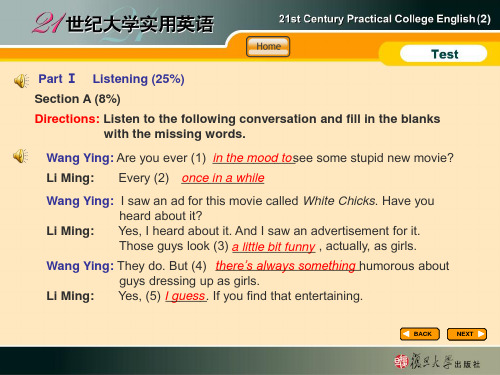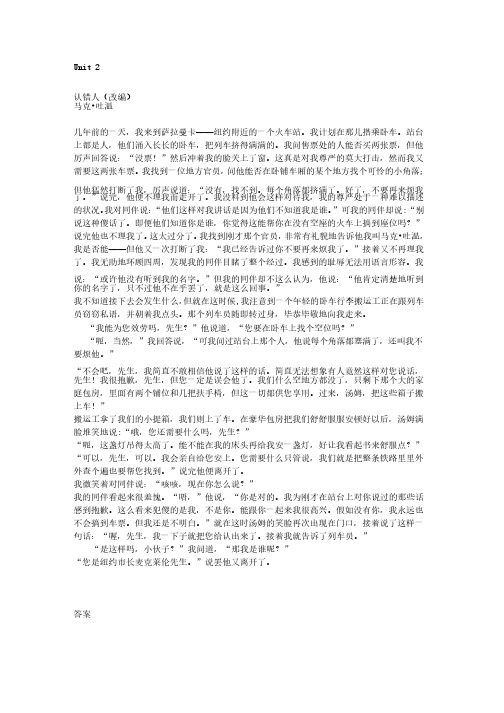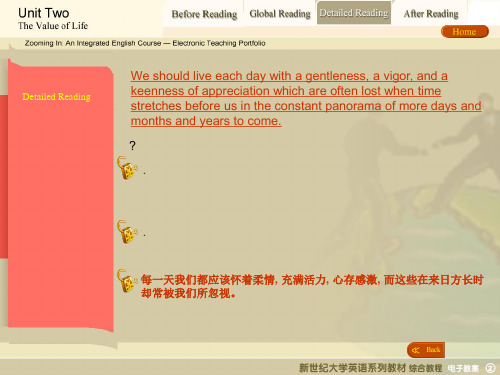21世纪大学实用英语综合教程2 unit2 课件
21世纪大学实用英语综合教程(第二册第1-4单元)-PPT文档

Wang Ying: I saw an ad for this movie called White Chicks. Have you heard about it?
Li Ming: Yes, I heard about it. And I saw an advertisement for it. Those guys look (3) a__li_tt_le__b_it_fu_n_n_y_ , actually, as girls.
As he was (10) _g_ro_w_i_n_g_u_p_ , Lenny taught himself how to play a number of musical instruments and sang in the famous California Boys Choir. He attended Beverley Hills High School but was not (11)a_n__e_x_c_e_ll_e_n_t _st_u_d_e_n_t . When he first heard the music of Prince he decided to drop the choir and (12)c_o_n_c_e_n_t_ra_t_e_o_n_ rock and roll. While still in high school, Lenny chose Romeo Blue as his (13) s_t_a_g_e_n_a_m__e and started performing locally. After graduating he was keen to (14) _fo_l_lo_w__a_c_a_r_e_e_r in music. Later Lenny dropped the name Romeo Blue and started performing (15) u_n_d_e_r_h_i_s_o_w__n_n_a_m__e . In 1989 Lenny released his first album, Let Love Rule, which was successful.
世纪大学实用英语综合教程第二册讲解材料

Understanding the Text
In the text, Mark Twain tells how he was given nice treatment because he was mistaken for someone else.
Reading Analysis
Topic
Part 1 (Para.1)
约翰考试是及格了,可是对这门学科掌握得并不好。
• asked him if I couldn’t …= I asked him if I could…
• The negation is used to indicate that the speaker is more polite and feels less likely to get what he asks. 否定的用法表示说话者的态度更客气,估计 自己的要求不太可能得到满足。
Though thinking himself to be well known, Mark Twain failed to get the train tickets he needed.
Details
Mark Twain asked for two train tickets three times and was answered with a sharp “No!” each time. Even the mention of his name did not work. Mark Twain felt ashamed as his company saw that his name was not so respected as he thought.
Language Points
Mark Twain /
21世纪大学实用英语综合教程(第二册)课文翻译及课后习题答案unit2

Unit 2认错人(改编)认错人(改编) 马克•吐温马克•吐温几年前的一天,我来到萨拉曼卡——纽约附近的一个火车站。
我计划在那儿搭乘卧车。
站台上都是人,他们涌入长长的卧车,把列车挤得满满的。
我问售票处的人能否买两张票,但他厉声回答说:“没票!”然后冲着我的脸关上了窗。
这真是对我尊严的莫大打击,然而我又需要这两张车票。
我找到一位地方官员,问他能否在卧铺车厢的某个地方找个可怜的小角落;但他猛然打断了我,厉声说道:“没有,找不到。
每个角落都挤满了。
好了,不要再来烦我了。
”说完,他便不理我而走开了。
我没料到他会这样对待我,我的尊严处于一种难以描述的状况。
我对同伴说:“他们这样对我讲话是因为他们不知道我是谁。
”可我的同伴却说:“别说这种傻话了。
即便他们知道你是谁,你觉得这能帮你在没有空座的火车上搞到座位吗?”说完他也不理我了。
这太过分了。
我找到刚才那个官员,非常有礼貌地告诉他我叫马克•吐温,我是否能——但他又一次打断了我:“我已经告诉过你不要再来烦我了。
”接着又不再理我了。
我无助地环顾四周,发现我的同伴目睹了整个经过。
我感到的耻辱无法用语言形容。
我说:“或许他没有听到我的名字。
”但我的同伴却不这么认为,他说:“他肯定清楚地听到你的名字了,只不过他不在乎罢了,就是这么回事。
”你的名字了,只不过他不在乎罢了,就是这么回事。
”我不知道接下去会发生什么,但就在这时候但就在这时候,,我注意到一个年轻的卧车行李搬运工正在跟列车员窃窃私语,并朝着我点头。
那个列车员随即转过身,毕恭毕敬地向我走来。
员窃窃私语,并朝着我点头。
那个列车员随即转过身,毕恭毕敬地向我走来。
“我能为您效劳吗,先生?”他说道,“您要在卧车上找个空位吗?”“我能为您效劳吗,先生?”他说道,“您要在卧车上找个空位吗?”“我能为您效劳吗,先生?”他说道,“您要在卧车上找个空位吗?”“呃,当然,”我回答说,“可我问过站台上那个人,他说每个角落都塞满了,还叫我不“呃,当然,”我回答说,“可我问过站台上那个人,他说每个角落都塞满了,还叫我不要烦他。
21世纪大学实用英语综合教程第二册第2单元

He was mistaken for the mayor of New York.
PREV.
NEXT
Topics for Discussion. 1. What do you think Mark Twain did after he knew that he was mistaken for
the mayor of New York? 2. Do you agree that the people in this story are mostly snobbish(势利的)?
He felt it was a heavy blow to his dignity. 4. Why did Mark Twain mention his name the second time he talked to the
local official? Because he wanted to take advantage of his fame to get onto the train.
BACK
NEXT
Paragraph Main Idea
2-5
Mark Twain was invited
by the conductor to get
onto the train.
Details
_A_y_o_u_n_g__p_o_rt_e_r_ whispered something to the conductor while _n_o_d_d_in_g__ towards Mark Twain. At once the conductor came to Mark Twain and invited him t_o_t_h_e__b_ig_f_a_m_i_ly__c_o_m_p_a_r_tm__e_n_t on the train.
21世纪大学实用英语综合教程-第二册-Unit-2

21世纪大学实用英语综合教程-第二册-Unit-2LT教案授课单元21世纪大学实用英语第二册第二单元本(章)节授课方式课堂讲授(√)实践课()教学时数 6授课要点本(章)节教学目标1. master the basic language and skills necessary to makeand respond to an apology;2. understand the main ideas of Text A, Text B and Text C;3. master the useful sentence structures and words andexpressions found in the exercises relevant to the firsttwo texts;教学重点和难点1. know how to use the structure of V + V-ing or + infinitive;2. know how to reply to an invitation;3. guess the meaning of unknown words in context.思考题或作业1. Have you ever been mistaken for someone else? Or do you know someone who has been mistaken for another person? Please share your story with your classmates.2. Now imagine you have the same name as the mayor of your city and look like him too. What might happen when you go to a hotel asking for a room and are told that the rooms are all booked?教学内容与组织安排1st period Listening and speaking2ndText Aperiod3rdText Bperiod4 thGrammar Reviewperiod5thPractical Writingperiod6thImprove Your Reading SkillsperiodTeaching procedures:First PeriodContent:Unit 2 listening and speakingStep 1 Lead-inIn the Listening and Speaking section, you will learn the basic language and skills necessary to make and respond to an apology;Step 2 Listening and Speaking1) The Language for Making and Responding to an ApologyA. have a warm-up activity by asking Ss what they say when they cause trouble to others or make mistakes;B. have the Ss listen to Exercise 1 (1-3 times) and fill in the blanks with the missing words;C. ask one S to read aloud the talk so Ss can check their completed answers;D. ask other Ss to form responses to the apologies in Exercise 2. trying to use the expression learned in Exercise 1.2) Making and Responding to an ApologyA.go through the new words in the 1st dialogue in Exercise 3;B. listen to the dialogue twice while filling in the missing words;C.ask Ss to answer the questions about the conversation by way of group discussion or the traditional teacher- student interaction;D.have them look for the language used to make and respond to an apology;E. Ss can role-play the dialogue;F. do the same with the second dialogueStep 3 Ask Ss to study the structures presented in Exercise 4, and create situations for dialogues in which Ss blame someone for his/her mistake or fault and expect them to make both apologies and excuses with the help of the language they have picked up in Exercise 1 and expressions from Exercise 4.Step 4 Listening PracticeA. Listen to the following people speaking and decide what they are talking about. (Each one will be given twice.)B Listen to the following five short dialogues and choose the appropriate answers.(Each one will be given twice.)C. Listen to the following short story twice. Listen carefully and decide whether the statements are true (T) or false (F) according to the story you have heard.D.Listen to the following talk and fill in the blanks with the missing words. (The talk is given twice.)E. Listen to the talk again and then answer the following questions orally.Answers to the listening practice5. C A D A B6. C A B D C7. T T F F T8. in a loud voice particularly interesting in the same room in curing them left alone a talk suffering from a delusion who are youStep 6 SummaryThere’re many ways of making an apology:—Excuse me for my interrupting you.—I’m really sorry for being late.—I’m terribly sorry to step on you.—I’ m awfully sor ry (that) I have forgetten your name.— I apologize for what I have said.—I’m afraid I seem to have forgetten your birthday.— I owe you an apology for the delay.—I’m sorry. I didn’t mean to hurt your felling.— It was really quite unintentional.— I hope you excuse me.There are also many ways of responding to an apology:—That’s (quite) all right.—These things happen; it can’t be helped.—I quite understand. Please don’t worry.— (Oh well.) Not to worry.—No problem. Let’s forget it.Step 7 Homework assignment1. Form a dialogue with your classmates.2. preview the new lesson.Second PeriodContent:Unit 2 Text AStep1 Lead-in1. Have you ever been mistaken for someone else? Or do you know someone who has been mistaken for another person? Please share your story with your classmates.2. Now imagine you have the same name as the mayor of your city and look like him too. What might happen when you go to a hotel asking for a room and are told that the rooms are all booked?Step 2 Ask Ss to read the following passage and see what happened toMark Twain when he tried to get a train ticket.Step 3 Introduce the Background InformationMark Twain (1835-1910)Mark Twain was the pen name of Samuel Langhorne Clemens, one of the major authors of American fiction. Twain is also considered the greatest humorist in American literature. Twain’s varied works include novels, travel narratives, short stories, sketches, and essays. His writings about the Mississippi River, such as The Adventures of Tom Sawyer, Life on the Mississippi, and Adventures of Huckleberry Finn, have been especially popular among modern readers. (From the 1998 World Book Encyclopedia)7-Eleven7-Eleven, Inc. is the world’s largest operator, franchiser and licensor of convenience stores with more than 24,000 units worldwide. Founded in Dallas, Texas in 1927 as an ice company, 7-Eleven pioneered the convenience store concept during its early years when its ice docks began selling milk, bread and eggs as a convenience to customers.The name 7-Eleven originated in 1946 when the stores were open from 7 a.m. until 11 p.m. Today, offering customers 24hour convenience, seven days a week is the cornerstone of 7-Eleven’s business. Approximately 5,800 7-Eleven and other convenience stores are operated and franchised in the United States and Canada.Step 4 Listen to the whole text and answer some questions about the text.Step 5 Deal with some languages points1) I was to take the sleeper train there: I planned to take the sleeper train there.我计划在那儿搭乘卧车。
新世纪大学英语 综合教程2 unit2精品PPT课件

所以我们忙于琐事, 几乎不曾意识到自己对生活的态度有多么冷漠。
Detailed Reading
I might have shown disbelief had I not been accustomed to such responses, …
春天里,我怀着希望触摸着树枝寻找新芽,那是大自然从冬眠中苏 醒第一个征象。
Detailed Reading
To me the colorful seasons are a thrilling and unending drama, the action of which streams through my finger tips.
Paraphrase this part of the sentence.
Perhaps it is common to all human beings that we seldom feel thankful for what we have and that we are eager to own what we haven’t.
The prisoner was condemned to death. We all strongly condemn violence of any sort.
我们强烈谴责任何形式的暴力行为。
Patterns: condemn sb. for doing sth. condemn sb. to sth. condemn sb. / sth. as sth.
Detailed Reading
condemn: v. give sb. a severe punishment after deciding they are guilty of a crime; say very strongly that you do not approve of sth. or sb., especially because you think it is morally wrong
21世纪大学实用英语综合教程(第二册)课文翻译及课后习题答案unit2.docx
21世纪大学实用英语综合教程(第二册)课文翻译及课后习题答案unit 2Unit 2The wrong person (adapted)Mark, Twain?One day a few years ago, I came to Salamanca, a railway station near New York・I plan to take the sleeper train thcrc. The platform is, they poured into the long sleeper, the train is crowded. I asked the man at the ticket office if he could buy two tickets, but he snapped: 〃no tickets.〃!〃And then closed the window to my face・ It was a real blow to my dignity, but I needed the two tickets again. I found a local official and asked him if he could find a poor corner somewhere in the sleeping car, but he snapped at me and snapped: 〃no, I can,t find it. 〃・Every corner is packed. Well, don,t bother me any more・〃With that, he ignored me and walked away. I had not expected him to treat me like this, and my dignity was in a state beyond dcscription. I said to my companion, "they talked to me like this because they didn,t know who I was・"But my companion said, 〃don't say things like that・ Even if they know who you arc, do you think it will help you get a scat on a train that doesn,t have an empty seat?" And he ignored me. This is away over the linc. I found the officer and politely told him my namc was Mark Twain. Could I - but he interrupted me again: ve told you not to bother me again."・〃Then he stopped talking to me.I looked helplessly around and found my companion witncssing the whole process・ The shame I felt could not be described in words・ I said, "maybe he didn't hear my name・〃・" But my companion didn't think so. He said, 〃he must have heard your name clearly, but he didn,t care,that's all. 〃I don,t know what will happen next, but at this time, I noticed a young porter of sleeping car whispering to the conductor, and nodding toward me. The conductor immediately turned around and walked reverent and respectful to me.,z What can I do for you, sir?" He said, 〃you need to find a place in the sleeper?""Well, of course, z,I replied, "but I asked that man on the platform, he said that every corner is full, also told me not to bother him・"〃No, sir, I can,t believe he said that・〃・I can,t imagine anyone talking to you like this, sir! T m sorry, sir, but you must have misunderstood him・ We don't have any room left・ There,s only the large family room with two berths and a few armchairs, but all of them are for you to enjoy. Come here, Tom・ Put these boxes on the bus!"The porter took our suitcase and we got on the bus・ After we had been comfortably settled in the deluxe room, Tom laughed and said, 〃0h, what else do you need, sir?"〃E T, the lamp is too high・〃・Can you fix me a lamp at my bedside so that I can read the book more comfortably?"Yes, sir, you can. 〃・I' 11 fix it for you personaily. What do you need to say, we are the whole railway and check a times to help you find・〃And he left・I smiled and said to his friend, "well, what do you say now?〃My companion looks ashamed・he said, "you're right・〃・r m sorry for what I said to you on the platform just now. So it seems stupid to me, not you. I'm glad to be with you. But for you, I wou 1 d never have gotten the ticket・ But I still don,t understand・〃Just then, Tom,s smiling face appeared again at the door, and then he said, "Oh, sir, I recognized you at once・〃・Then I told the conductor・"〃Is that so, young man?" "Who am I?〃I asked"〃You are Mr. Mcclellan, mayor of New York・"Then he left again.AnswerFive1.bother, bother2., companion3. , Shame4. , officials5., notice6. recognized7. vacant8. scene9. politely 10. describeSix1.,cut, short,2., at, their, disposal,3., at, the, same, time,, in.・・ Face5., turn, your, back, on,6. , a, couple, of,7. , turned. •・Inside out 8. Look aroundSeven"Must have seen the tickets for tonight" s play2., must, have, been, here, many, times3., may, have, gone, bad4.,may, not, have, received, the, presentEightThe "Nancy was glad to have quit her part-time job her before final exams. z/〃Aren t you ashamed to have eaten all the fruit in the basket?"The 〃We are really grateful to have received so much care during visits our here・〃"Henry was foolish to have trusted such a liar・"Nine〃The public that noticed since that official left local hisposition had been vacant for a couple of months・〃"Seeing the looking girl around helplessly the platform on the young porter asked politely if she needed any help.,zThe 〃I recognized your companion the minute he appeared at the door. He looked just as you had described・〃"We, didn, , t, bother, to, find, a, hotel, for, my, good, friend, US, to, stay, in, her, invited, house, and, put,, a, luxurious, disposa 1., car, at, our. 〃Turning While the professor was the suitcases inside out to his find glasses his wife was sitting comfortably in an armchair watching the whole scene・〃I turned my back on her because she expected me to treat her like a queen."Ten"Seeing a doctor as soon as possible"2.,working, for, another, hour3. , buying, a, new, car4.,going, to, the, cinema5.,having, been, to, New, YorkSix我辞职7o说它8o被认可9o花光了所有的钱10o我失去工作但愿保罗?莫纳汉我在一家7-11商店里已经工作了两年,自以为很善于处理我们经理所说的”与顾客的关系” To我坚信,一个友好的微笑和脱口而出的”先生”、”女士”和”谢谢”就足以让我应付任何可能岀现的情况,无论是安慰缺乏耐心或难缠的顾客,还是为找错零钱而道歉。
21世纪大学实用英语综合教程(第二册)
21世纪大学实用英语综合教程(第二册)___________________________________________________UNIT 1误会他头发蓬乱,衣着肮脏,口袋里只有35美分。
在马里兰州的巴尔的摩,他登上一辆公共汽车并径直走向了洗手间。
他想如果他躲在洗手间里,便可以不付钱就乘车去纽约。
但是坐在公共汽车后面的一位乘客看见了他。
她拍了拍她前面那位乘客的肩膀说:“洗手间里有个流浪汉。
告诉公共汽车司机。
”那位乘客轻轻地拍了一下坐在他前面的人,说道:“告诉公共汽车司机,洗手间里有个流浪汉。
这口信通过一个又一个的乘客传到了公共汽车的前边。
但在这一过程的某个环节,口信变了。
当它传到公共汽车司机那儿时,已经不是“洗手间里有个流浪汉”,而是“洗手间里有颗炸弹”。
司机马上在公路边停下车来并用无线电通知了警察。
当警察到达时,他们让乘客下车并且远离汽车。
然后他们关闭了那条公路。
那很快就造成了15英里长的交通堵塞。
警察在警犬的帮助下,在公共汽车上搜查了两个小时。
当然,他们没有发现什么炸弹。
两个发音相似的英语单词给一个想从洛杉矶飞往加利福尼亚州奥克兰的人也造成了麻烦。
他的问题始于洛杉矶机场。
他以为听到广播中宣布了他的航班,所以他走向登机门,出示了机票并登上了飞机。
起飞20分钟后,这人开始担心起来。
奥克兰在洛杉矶的北边,但是飞机似乎正在向西飞,而当他向窗外望去时,他所能看到的全是大海。
“这架飞机是去奥克兰吗?”他问航班服务员。
航班服务员倒抽了一口冷气,“不,”她说。
“我们去奥克兰——新西兰的奥克兰。
”因为有这么多英文单词发音相似,讲英语者之间的误会并不罕见。
并非所有的误会都会导致公路关闭或乘客飞错大陆。
大多数误会远没有这么严重。
每天讲英语的人会相互问这样的问题:“你是说七十还是十七?”“你是说你能来还是不能来?”发音相似的单词对把英语作为第二语言的人来说,特别容易让人混淆。
一天早晨,一位生活在美国的韩国妇女到上班地点时,她的老板问她:“你拿到盘子了吗?”“没有……”她回答说,心里却在纳闷,不知道他到底是什么意思。
21世纪大学实用英语综合教程第2册
Cats are common pets in England.
T 猫是英国的常见宠物。
It is quite common for him to talk in his sleep.
T 他常在睡梦中讲话。
The garden is common land.
T 公园是公有土地。
We have a common purpose.
to you. I even asked my friend about how to tell you this — you see, I think you’re a nice guy but I don’t want to date you.”
?
PREV.
NEXT
Text A
4 Honesty makes things so simple.N It’s not that humanity will love you more if you don’t tell lies, but that honesty, with tact, is the easiest
21世纪大学实用英语
21 世纪大学实用英语
综 合 教 程(第二册)
Objectives
Unit7
1
master the basic language and skills necessary to fulfill obligations;
2
understand the main ideas of Text A and master the useful sentence structures and words and expressions;
Jane and I have much in common. = I have much in common with Jane.
21世纪大学实用英语综合教程第二册课件
Ironically, in 1978, when Jordan attended Laney High School in Wilmington, North Carolina, he was cut from the varsity team. Instead of giving up, however, he fought through adversity and became the greatest basketball player in the world. Between the 10th and 11th grade, Jordan grew from 5’11” to 6’3”, and because he had improved greatly as a player, he made the varsity team the following year. Jordan played so well in his junior season that he was invited to attend the Five Star Camp in Pittsburgh, Pennsylvania, during the summer before his senior year. By the time Jordan was finishing his senior year at Laney, he had grown to 6’5” and attained a basketball scholarship from the University of North Carolina. Jordan’s ever-growing popularity began at UNC where he made a last minute game winning shot in the NCAA championship game. In the summer of 1984, Jordan played on the US Men’s Olympic Basketball Team under head coach Bobby Knight. The team had such college players as Jordan, Patrick Ewing, and Chris Mullin (NBA players weren’t allowed to compete in the Games until 1992). Jordan’s plays quickly awed the other teams.
- 1、下载文档前请自行甄别文档内容的完整性,平台不提供额外的编辑、内容补充、找答案等附加服务。
- 2、"仅部分预览"的文档,不可在线预览部分如存在完整性等问题,可反馈申请退款(可完整预览的文档不适用该条件!)。
- 3、如文档侵犯您的权益,请联系客服反馈,我们会尽快为您处理(人工客服工作时间:9:00-18:30)。
the Listening and Speaking
section and invites a few students to tell their classmates their opinions on
PREV.
NEXT
Time
Contents
Plan
the topic of “Do college students handle well situations that need an apology?” Then,
Practical Writing
2) Practical Writing
The teacher tells as well as shows the students how to reply to an invitation by doing Ex.12 of
PREV.
NEXT
Time
Contents
Preview Ⅰ. Objectives Ⅱ. Suggested Teaching Plan Ⅲ. Background Information Ⅳ. Class Presentation
Preview
This unit looks at some human encounters. In the
2) Making and Responding to an Apology
A. Go through the new words in the first dialogue in Ex.3;
PREV.
NEXT
Time Contents
Plan
B. Have the students listen to the dialogue twice and fill in the blanks with the missing words;
BACKBiblioteka Ⅰ. Objectives
After studying this unit, the students are expected to be able 1. master the basic language and skills necessary to
make 2. aunnddreerssptaonndd ttoheanmaapionloigdye;as of Texts A and B, and master
(2); 4. know how to reply to an invitation;
5. read the signing system used in Britain; 6. guess the meaning of unknown words in context (2).
BACK
Ⅱ. Suggested Teaching Plan Suggested Time and Teaching Plan for Unit 2
to read students
can check their completed
answers;
PREV.
NEXT
Time Contents
Plan
D. Ask other students to form responses to the apologies in Ex.2, trying to use the expressions learned in Ex.1.
2 periods Text B & text-related exercises
Plan
Practical Writing, and then
requires the students to do Ex.13 and Ex.14 as their homework.
1W) Theixlet dBiscussing the text with
the teacher turns to the Reading and Writing section. (These
activities should be completed in 15 minutes.)
PREV.
NEXT
Time
Contents
Plan
Text A & text- 1) Starter
related
After a brief explanation of the
exercises
instructions, the teacher
A. gives the students a few minutes to think about the questions in the starter;
mistakes;
PREV.
NEXT
Time Contents
Plan
B. Have the students listen to Ex.1 (1-3 times) and fill in the blanks with the missing words;
C.
Ask one aloud the
student talk so
Listening and Speaking exercises as follows:
BACK
NEXT
Ⅱ. Suggested Teaching Plan Suggested Time and Teaching Plan for Unit 2
Time
Contents
Listening and Speaking
Time
2 periods
Contents
Previe w
Plan
The teacher begins with the
Preview to make sure that the
students have some idea of what this unit is all about. After that, the teacher activates the
C. Ask students to answer the questions about the dialogue;
D. Now have them look for the language used to make and respond to an apology;
PREV.
NEXT
Time
PREV.
NEXT
Time 1 period
Contents
Plan
Grammar 1) Grammar Review
Review The teacher explains the subject-verb agreement (2), and asks the students to do the grammar exercises in class.
PREV.
NEXT
Time
Contents
3
periods
Review of the listening
and
speaking
skills the
students
have learned
Plan
The teacher begins with the assignment mainly to review the functional and notional language the students picked up in the previous unit. The teacher asks some students to answer the questions in Ex.9 of
periods);
PREV.
NEXT
Time
Contents
Plan
B. guides the students through the exercises, focusing on certain items or leaving some exercises as the students homework according to the students different levels of English (one period).
them identify the main idea of
each paragraph and analyzes
some difficult sentences and
some language points while
discussing the whole text with
the students (one and a half
Contents
Plan
E. Next, students can role play the dialogue;
F. Then have them either do the same with the second dialogue or be creative with it;
PREV.
NEXT
Time
Contents
Plan G. Finally, study the structures
presented in Ex. 4, and create situations for dialogues in which students blame someone for his/her mistake or fault and expect them to make both apologies and excuses with the help of the language they have picked up in Ex. 1 and the expressions from Ex. 4.
